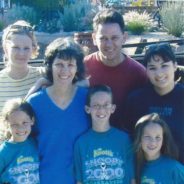Snapshots of Dementia: Memory Matters
Photo by RoonzNL on Pixabay Although the frontal-lobe aspect of Tom’s dementia means we noticed devastating behavioral changes, his memory loss has also been a consistent sign and symptom. Throughout our journey, I’ve heard comments such as, “Oh, I forget things all the time!” or “I do that too—maybe he’s not as bad as you think!” While yes, we all forget things, there is a definite difference between forgetfulness associated with normal aging and forgetfulness associated with dementia. I won’t go into those details here, but you’ll find a good explanation at this link. In short, experts often use the term “memory loss that disrupts daily life” to distinguish it from more normal, age-related memory loss. I’ll give you a few examples from various points in Tom’s journey that I hope will illustrate why memory matters and how debilitating it can be. Work: While Tom was still employed as a minister of music, he had increasing trouble keeping track of the details needed to serve a midsize congregation (around 500 in attendance total at three different services). The last year or two, when he led choir rehearsal, he invariably left one or two songs out of the audio file he had prepared in advance. After he lost his job and I spoke with our former senior pastor (who had retired the year before), I learned that often, he and Tom would have a discussion that Tom didn’t recall even a few days later. During this time, he also struggled to use his in-ear headphones and fumbled with his mic nearly every week; he also forgot preplanned details of the services. Home: Long before diagnosis, we had to install special hinges on our front door to close it after Tom left it wide open more than once when he left for work. Nowadays, his memory has declined enough that he leaves other doors open on a regular basis: cabinets, dishwasher, refrigerator, freezer—I often think about how short his memory must be if he can’t remember to close a door he has opened only seconds before. As you can imagine, he loses and has lost various items for years—I’ve sometimes wished I could have all the time back that I’ve spent hunting for them! We do use a Tile tracker and connected app on the most essential items, but it’s amazing how quickly he can lose the remote, his phone, his reading glasses, his coffee mug, or whatever object was last in his hand. Outings: Memory loss makes it increasingly difficult for Tom to navigate places he doesn’t know well. When we go to a store and he needs to use the restroom, I stand near the door, or he won’t find his way back to me. He hasn’t driven for nearly three years now, but when he—who, unlike me, had always excelled at directions—couldn’t find even familiar places, I knew something was wrong. For right now, we still sing in our church choir, but he invariably gets confused about how to get from the choir room to the platform, and I try to make sure one of the other men helps him navigate. Relationships: Memory loss affects his relationships as well, and this goes beyond the normal not remembering someone’s name that we all experience at times. He does remember some people, but...
read moreSnapshots of Dementia: Roller Coaster Ride
Photo by Justin on Unsplash Twists. Turns. Slow, then fast. Up, up, up—then plunging down. And sometimes, what seems like a complete reversal. That describes not only a roller coaster ride but our journey to and through diagnoses (intentional plural). In this post from a few weeks ago, I shared how after a long wait, Tom was finally approved for disability payments through the Social Security Administration. I no longer had to jump through hoop after hoop to get doctors to agree that something was wrong with him and/or agree on a diagnosis, which had previously wavered between frontotemporal degeneration, behavioral variant, and young-onset Alzheimer’s Disease (“young” onset means symptoms develop before age 65, and Tom had symptoms well before age 60, which is when I finally convinced him to see a neurologist). As it turns out, we weren’t done with the diagnosis process after all. As I also mentioned in that post, we had one unsatisfactory visit to a neurologist in our new home state of South Carolina (where we moved in late 2019; we had seen a total of four neurologists in Florida). Once the perceived urgency of diagnosis was over, I didn’t want to go back to that doctor. I took the advice of a local friend and called the Brain Health Center at Emory University in Atlanta. We had tried to get Tom accepted there once before, but at the time, they wouldn’t take patients who lived more than an hour from the hospital (we live two hours away). Both the pandemic and the fact that Tom now qualified for Medicare helped us. When I called in the spring of 2021, the screener said she would call me back “in a day or two” if he qualified. I got a call back that same afternoon. A few weeks later, we met with Tom’s new neurologist for the first time—via Zoom as we sat parked outside a restaurant in Georgia (we had to be physically in the state because of medical licensing requirements). They had no in-person appointments, but I filled out multiple questionnaires ahead of time. The neurologist listened to both of us (although Tom stopped participating early on), asked insightful questions, and wanted to hear various details of Tom’s health. I mentioned that although many of his behaviors/symptoms were consistent with FTD, his early memory problems seemed to point more toward Alzheimer’s, and he had received both diagnoses. To firm up the diagnosis, this neurologist recommended a lumbar puncture and an MRI (his third since 2017). We had declined a LP a few years prior, concerned about putting Tom through a stressful procedure, but this time, I said yes. Since I had gone to the trouble of taking him out of state to a top-rated brain clinic, I felt I should follow the neurologist’s recommendations, and he felt these tests were necessary to provide the best treatment for Tom going forward. We couldn’t get an appointment till November, but he could have both procedures done the same day. What I didn’t know in June was that I would end up having shoulder surgery in early November, so our oldest daughter drove Tom to his appointments and accompanied him to both the tests. In her characteristic style, she also made sure he had a fun day that included...
read moreSnapshots of Dementia: 5 Ways Parenting Prepared Me for Caregiving
Pieper Family, 2003 “It must be so hard.” “I know you didn’t expect this.” “No one thinks about this when they say their wedding vows.” I’ve heard all the above comments my status as the spouse of a person living with dementia. All are true. But, like almost any other statement someone might make, none reflects the full picture. Yes, it is hard. No, I didn’t expect it. And no, I didn’t think about this particular situation when I said my wedding vows—although I did, and do, believe “for better or worse” means exactly that. Of course, my faith also means I believe God knew Tom and I would one day find ourselves here. Not only that, but I also believe He prepared me for the role of care partner long before I ever officially (and, before that, unofficially) accepted that assignment. One of the ways He did this was by allowing me the privilege of parenting five children. Parenting shaped my life and my character in significant ways, many of which made me the person I am today. Of course, I am neither a perfect parent nor a perfect caregiver, and I hope my writings in this blog and elsewhere never imply that. Instead, I consider myself a grateful parent and caregiver who knows God has called her to this specific assignment at this specific time and done what He always does when He gives an assignment: prepared me to accept it and equipped me to pursue it. Here are five ways I believe parenting prepared me for my current role: 1) Parenting taught me patience. Parents either learn patience or make themselves and their children crazy. Of course, patience is also a fruit of the Spirit, so I have some supernatural assistance in this area. Whether in dealing with Tom’s obsessive behavior, repeating an answer to a question he has already asked multiple times, or following behind him to close doors/pick up dishes/retrieve misplaced items, I need lots of patience. Every day. 2) Parenting made me flexible. My experience both as a parent and as a sometime-missionary taught me to go with the flow. When I first took a 9-5 job after many years at home, one of my coworkers told me I was the most laid-back person he had ever met. But that didn’t always describe me. Once again, God used my parenting experience to help me realize things don’t always go as anticipated and that getting upset helps no one. When Tom takes longer than I expected to get for an activity even when I’ve allowed what I thought was extra time, or when his dementia means our plans must change on short notice, this quality has served me well. 3) Parenting helped me become a better listener. Almost every mom will tell you she hears what her kids say and learns to hear what they don’t. As children grow, they tend to tell their parents less. A wise mother learns to interpret attitudes behind actions, capitalize on what are often rare moments of openness, and catch the unspoken behind the overt. As Tom moves further in his dementia journey, his language skills are declining. He says less, and what he does say may come out halting or confused. I’ve learned to discern (most of the time) when his statements are...
read moreSnapshots of Dementia: Two Is the Loneliest Number (and Other Reasons I Cry)
Photo by Xianyu hao, Unsplash I am a person of tears. I cry when I’m sad. I cry when I’m happy. I cry when I worship. I cry—you get the picture. My children remember me not as the mom who screamed when they were disobedient but as the mom who (you guessed it) cried. I’ve written before about these tears here and how, in Tom’s (more and more rare) moments of awareness of his condition, sometimes, we cry. As far as I can tell, I feel things more deeply than many people. I believe this quality makes me a better intercessor and a better writer, but it also means that, as the wife of a man living with dementia, I cry. Why do I cry? Not because of the pain of the past, the years when doctors kept saying Tom was fine but his behavior showed us he wasn’t. Not because of the responsibility. Yes, it still feels like a weight—being in charge of everything about our lives together, from small to big decisions, tasks, schedules, and everything in between—but God has given me what I need, and I’m consistently amazed at His provision. Not because of the diagnosis. Knowing Tom has what I consider a terrible disease makes me sad, but we waited so long to receive medical affirmation of our suspicions that when it came, I felt more relief than sadness. Not because of lost jobs. I did cry—a lot—when Tom had to leave his final worship pastor position. We loved our church and the people there. But Tom was in such a bad place emotionally/spiritually/and of course cognitively at that time that I knew something had to shift. So although the tears came, I also realized it was time, probably past time, for him to go. So why do I cry? Because of our children. Every mother will tell you she’d rather hurt a thousand times herself than see her child hurt once. All our children are grown now, but their father’s disease still wounds them. We all hate the way dementia is stealing him from us. And I know it gives them additional concerns for the future, all of which I wish I could remove but none of which I can. Because of our grandson. As I wrote about here, Lincoln and his love for Grandpa have taught me much about genuine love. Lincoln doesn’t mind that Grandpa gets mixed up easily, makes awkward comments, or doesn’t remember what someone told him only a few minutes earlier. But knowing that this little boy will continue to grow, change, and progress while Grandpa grows, changes, and regresses? That makes my heart hurt and my tears flow. For Grandpa—and for a little boy who has never known him healthy and whole. Because two is the loneliest number (when one has dementia). I still talk to Tom as though he can understand everything I say. In reality, he needs information in small bites, and may not remember it even then. I still lean my head on his, hold his hand, and give him hugs and kisses. I still consult him on decisions even though in reality, he won’t offer input. But more and more, our relationship resembles that of a very large child and parent rather than that of...
read moreSnapshots of Dementia: It’s Complicated
Photo by TheDigitalArtist on Pixabay That brief phrase might be my best answer to the question I hear most often about my husband: How’s he doing? I doubt those who ask have time or desire to hear the long version of my response. So “it’s complicated” works well. Before I had the privilege of carrying a child, I thought pregnancy meant you gained weight, your abdomen grew larger, and in nine months, you had a baby. I had no idea that so many areas of my body, from hair to fingernails to feet, would change as I journeyed through those months. That’s how dementia is. Before it struck our family, I pictured it as a primarily a memory problem. For Tom (but not for all people living with dementia) memory loss plays a big part, but dementia affects so much more than memory. The best way I can think of to explain “it’s complicated” is to compare how he was two years ago (just after we moved to our home in South Carolina) to now in several key areas. 2020 SPEECH: Has become increasingly halting. VISION: Poor depth perception. MEMORY: Remembers many people but not dates and events; needs daily reminders to take medication. DIET: Normal, some food and drink obsessions. Has lost his sense of smell, which has begun to affect his sense of taste; likes and dislikes are changing. HOUSEHOLD TASKS: Little initiative to help on his own but vacuums, mops with reminders, and does occasional other chores. FINANCES: Can no longer manage bank accounts or personal finances; still has a debit card and one credit card that I monitor. EMPLOYMENT: Retired after losing three successive jobs in late 2018/early 2019, all dementia-related but has no benefits. DRIVING: Our family asked him to give up driving in April 2019 after minor accidents plus observation of his driving; still wants to transfer his Florida driver’s license to South Carolina “just in case.” PERSONAL CARE: Normal except that he stopped going to the dentist a few years ago and needs treatment. BALANCE: Diagnosed with a balance problem in late 2019 and had a few weeks of physical therapy. SWALLOWING: No known issues; coughs (a lot) and chokes (sometimes). SLEEP: Normal; was acting out his dreams and had restless nights until one neurologist prescribed an antidepressant. INTERESTS: Decreasing; still engages with family with encouragement, enjoys church, music, movies, TV, reading, golf, and has obsession with an online golf game. Will often choose this game over engaging with family. A former professional trumpet player, he has not practiced consistently since May 2017. 2022 SPEECH: Much slower with frequent pauses, often gives up. VISION: Narrowing field, misses many objects. MEMORY: Remembers people but often forgets names; rarely knows what day it is; I now dispense all medication. DIET: Appetite control seems “broken,” can consume huge quantities or very little without seeming to notice. Obsessed with sweets, pepper, and very hot food. . HOUSEHOLD TASKS: Willing to help but rarely follows through; still helps when we work together. FINANCES: No longer has any bank or credit cards. I tried a children’s debit card with controls, but he lost it. EMPLOYMENT: The Social Security Administration declared him fully disabled in February 2021. DRIVING: No longer has a desire to drive but sometimes calls out...
read more








